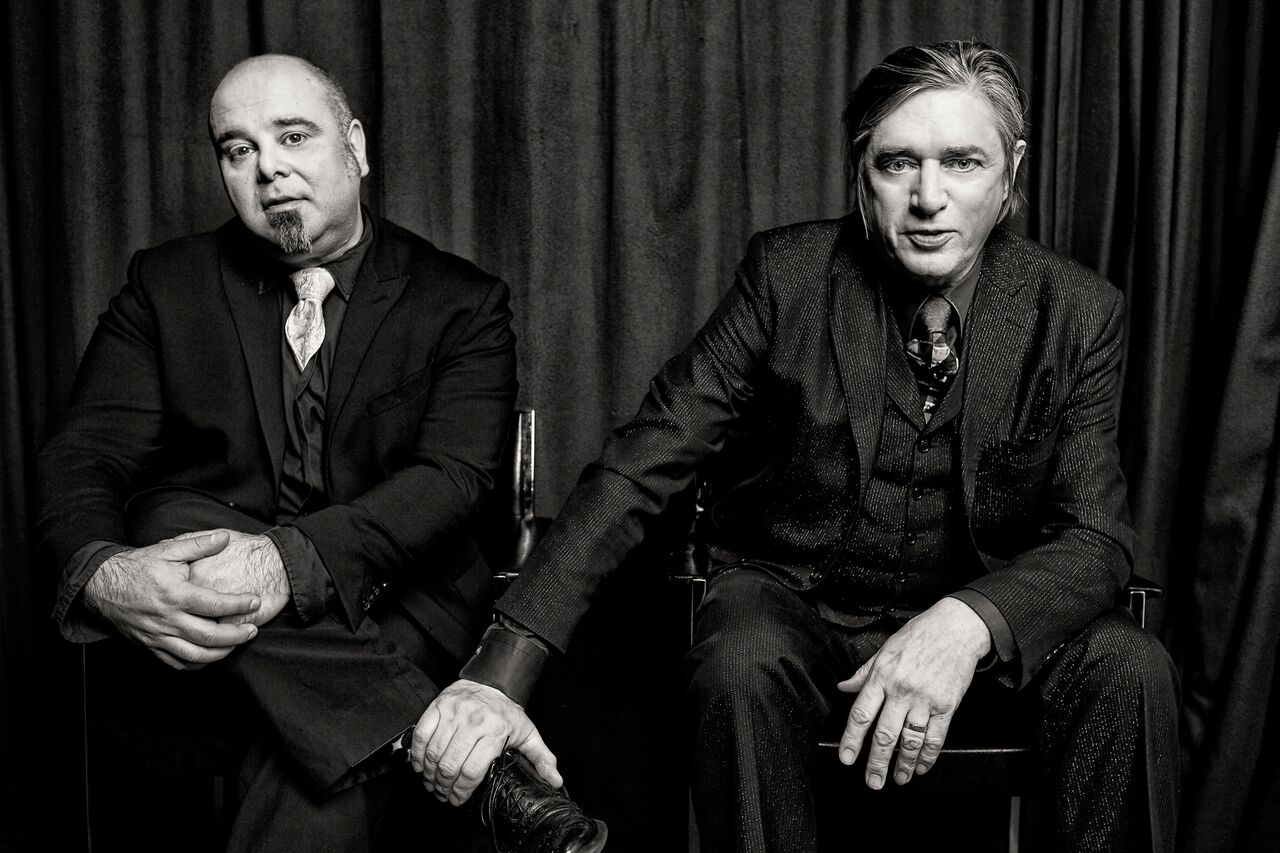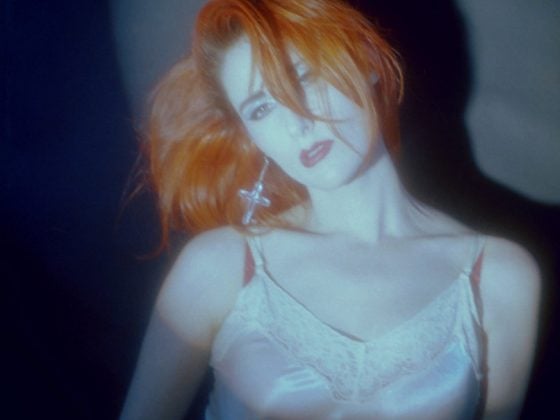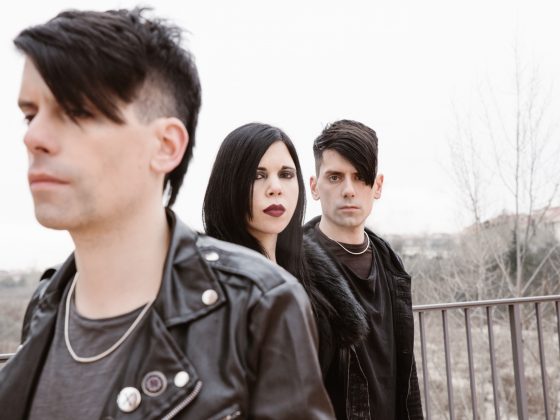What the hell is industrial? Monte Cazazza or Marilyn Manson?
Recently, Blixa Bargeld and Teho Teardo were guests of November 2018’s Industrial Festival in Wroclaw. The pair were there promoting their second album, Nerissimo, but the pair have also indicated that they are currently already working on the album number three.
Also during the interview, conducted just a few hours before concert, we discussed What molecules sound like, what is wrong with modern music and what industrial really is.
You can read this interview in polish at UNDERTONE
Each of you has worked on many musical projects, soundtracks for movies, theater plays. Was it difficult to get along at the beginning?
Blixa: The creative process is completely different in each band. If there are at least two people in it, chemistry is constantly changing… In the bands in which I was active, whether in Neubauten or in the Bad Seeds, the creative process was completely different, it had only one thing in common – it was old-fashioned. People worked together…
Teho: … in the same room.
Blixa: Exactly. Working with Teho as a duo, the process is more like a ping pong game. Two people reflect the same idea, their reflections collide. They constantly changing it. We prefer to do it in one place, staying with each other.
Why is it so important to you?
Teho: It’s just a pleasure. I prefer that system of work.
But this is a certain difficulty, after all you don’t even live in the same country.
Blixa: It’s not a problem, we’re not so far apart. Sending files via e-mail changes the creative process completely, it is simply not the same.
Teho: I do not think we’ve ever sent anything this way. (laugh)
You are quite an unusual duo. At the beginning did you have any problems in communicating? Have you clashed with stereotypes about your origin?
Blixa: It is quite the opposite. When Teho shows me his ideas, he is very accurate, he has a vision. I am the person who fucks it up.
Teho: (laughs) In the meantime, Blixa learned quite well the Italian language …
Blixa: Yes, I got a temporary Italian passport. (laughs) In general, Teho is an Austrian …
Teho: Do not say that!
Blixa: The land you were born to belonged to Austria.
Teho: Yes, but when I was born, they were Italian. My parents come from Venice, the oldest Italian settlement.
Blixa: Okay, you’re not an Austrian.
Following this line of reasoning, I am German.
Blixa: Are you from Wroclaw? Do you know that the Italians still calls it Breslavia? It turns out that they never changed the naming. By the way, I learned that there is a direct train from Wroclaw to Berlin. The trip is only four hours long! And they put me in a fucking plane with a transfer in Frankfurt!
Are you interested in pop culture?
Blixa: No. I am known for not knowing anything. My friends can throw any name, and I have no idea who it is. Recently, I found out who Kanye West is, but only because he visited Donald Trump. (laughter) Have you heard this poem by Leonard Cohen about Kanye West? It’s brilliant! “Kanye West Is Not Picasso.” (he begins to quote and laugh more and more)
Do you listen to contemporary music?
Blixa: I’m listening to the radio. My favorite show is BBC 3 Late Junction, there is great experimental music and everything that is outside the mainstream.
Teho: I really like the schizophrenic nature of this program. You’ll find everything in there.
Blixa: By the way, German radio, which I sometimes listen to, in the morning plays more Italian than German music. It turns out that I am better informed about what is happening in Italy than in Germany! (laughs)
Every time I hear a song in German, I want to turn off the radio … Usually this music is unbearable, it’s very bad … I know these people are aware of my existence, they know who I am. And they certainly know that I am ten times better than them. (laughs) I’m not saying I’m Picasso … but I’m ten times from every German singer.
Okay …
Yes! Write it down. I am not ashamed of this.
Teho: My friend is not shy.
Blixa: Of course, you have to put it in context. I have over forty years of musical career behind me.
In Wrocław, you will play with a local string quartet.
Blixa: In every city we rent such a quartet. It is simply cheaper, economical. Music notation is universal, musicians in a given city simply get the notation and prepare to perform with us.
You are headlining the Industrial Festival. Although you, Blixa, do not have the best associations with this word …
Blixa: I hated it when they called us that. For me, industrial is Throbbing Gristle. The end. They invented the term. Then it disappeared for a long time, then appeared in the USA and was described in such different things, from Ministry to NIN … everything was industrial! If you use such words, especially in music journalism, you have to be very careful … What the hell is industrial? Monte Cazazza or Marilyn Manson?
I just do not want to be pigeonholed. I wrote a song about it – New No New Age Advanced Ambient Motor Music Machine.
It is a very capacious species.
It’s even worse! Now, suddenly, everything is industrial. Do you know what was the idea of industrial, the real one? I think Monte Cazzaza himself said it. But Genesis and Peter Christopherson used it in their art. And this is the one and only thing everyone is forgetting about now. MUSIC IS NO PLEASURE! (hits his hand on the table)
Teho: It was a very strong concept.
Blixa: “We’re not here to please you…” And if you look at those bands that are called industrial ones… that’s the one thing they forget about. Now it’s just a style like electro, it does not represent anything. People deleted NO PLEASURE from the equation.
And what about experimental music?
Blixa: There is no such thing as experimental music in the pure sense of the word. You would have to imagine a laboratory where you do the research in the conditions you know, and you examine the nature of the acoustic of the objects you do not know completely. Then you can call it experimental music. But by extracting sounds from things whose sound is known… it’s not experimenting. All these bands work on materials they know, in the conditions they know, so the result too. So what’s experimental about this? Holding a piece of metal in your hand and hitting it with something is not experimental, because we know how it sounds.
Teho, you recorded with Nurse With Wound.
Teho: Yes, I was a child then. I was 17 years old.
Blixa: They are my age?
Teho: No, they are older than you.
Blixa: Oh! There is someone older than me.
You played in different, not to say – experimental projects, and now you record such an easy to perceive music.
Teho: If I listen to music, I never think about whether it’s hard to listen to it. For me, the most important thing is whether it is interesting or not.
Blixa: Yes, I cannot classify it either. Is something easier or harder to listen to… when I was on vacation with friends and listened to BBC 3 Late Junction broadcasts, they begged me to turn it off, they could not understand how I could listen to such a cacophony. And I said I had to listen to it, it’s my job. From here I get my information! (laughs)
It seems to me that it depends on the situation. In some you are able to bear more, take more. It is known that I would not listen to NWW in the car, it requires more concentration. There are many genres of music that fit different situations, but I would not classify them in terms of difficulty in perception.
In interviews, you admit that the second album was made because you liked work together. So what about the album number three?
Teho: Oh, we’re working on it! We create something all the time.
Blixa: I have to be pushed. Writing music is easy for me, but writing lyrics is a real torment.
Teho: You wrote the text to Nerissimo in a few hours.
Blixa: That’s true, but I have to find myself in a specific mood to write. Getting there is quite tiring. So I avoid it as long as possible. I am unbearable then, to be honest. There are days when I write a text in a few moments, these are great days! When I fall into the right way, writing goes really easy.
Can you tell more about this process?
Blixa: I usually do a lot of notes. Then I have to analyze them. Think about where their structure guides me and whether it agrees with the structure of the work. With Nerissimo it went so smoothly, because the structures matched. There is an interesting story connected with this. When I wrote the lyrics for this song, I took all the notes and put them in a row. I silenced the music of Teho and I recorded my lyrics on it.
Teho: Amazing! He did not hear the song before.
Blixa: Amazingly, it turned out very well. The elements fit together. If you listen carefully to the Nerissimo, you will hear the sound of the cello. It was not supposed to be there, I cut it out of the internet radio, then of course we looped it down, but it was a pure coincidence. As we said before, I’m not arranged. I like to play, use other people’s sounds. BY THE WAY! I have found beautiful sounds lately …
Teho: Molecules?
Blixa: Yes! The sound of molecules. Incredible. When I heard it for the first time, I was speechless. You can hear them in the DHX2 song. Great. In general, we are lucky with our music. When writing one of the last songs, I told Teho that celesta would ideally fit there. A few days later, it turned out that one of the Italian operas sold out all of it’s instruments and turned to Teho if he would not be interested in buying them. And there was a celesta on the list! (laugh)
Teho: I only bought this one instrument.
Blixa: It’s really amazing …
When you tell all these stories, it looks like you have a great time together.
Teho: That’s true.
Blixa: That’s the point, right?















 Or via:
Or via: